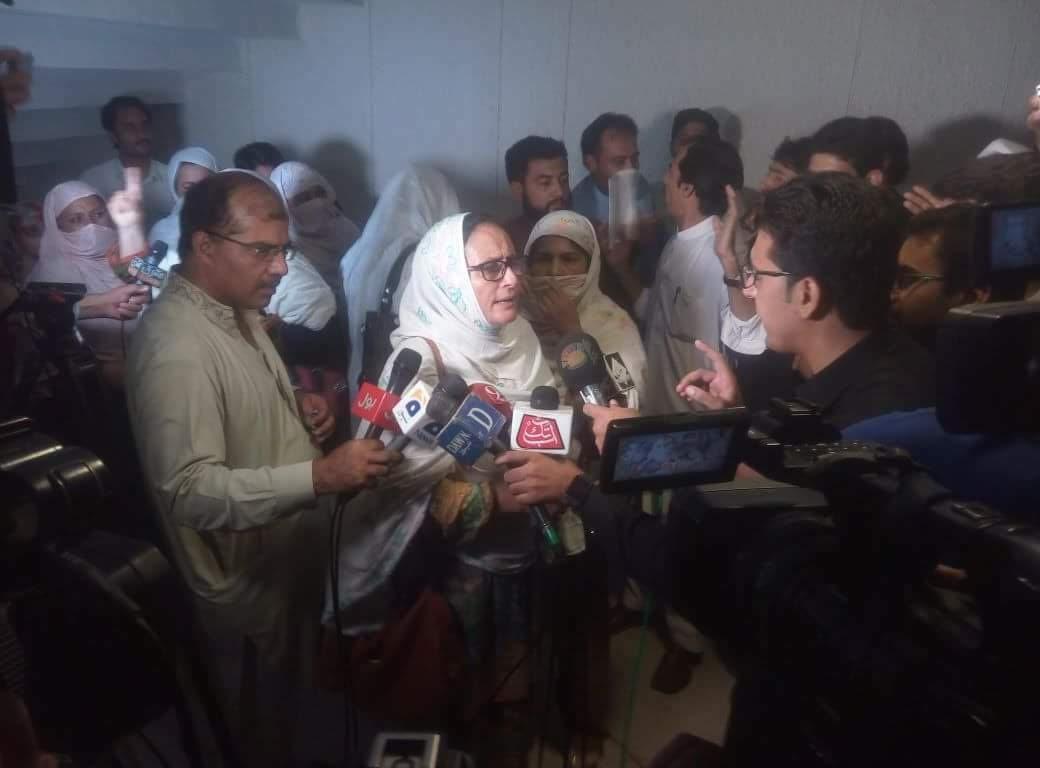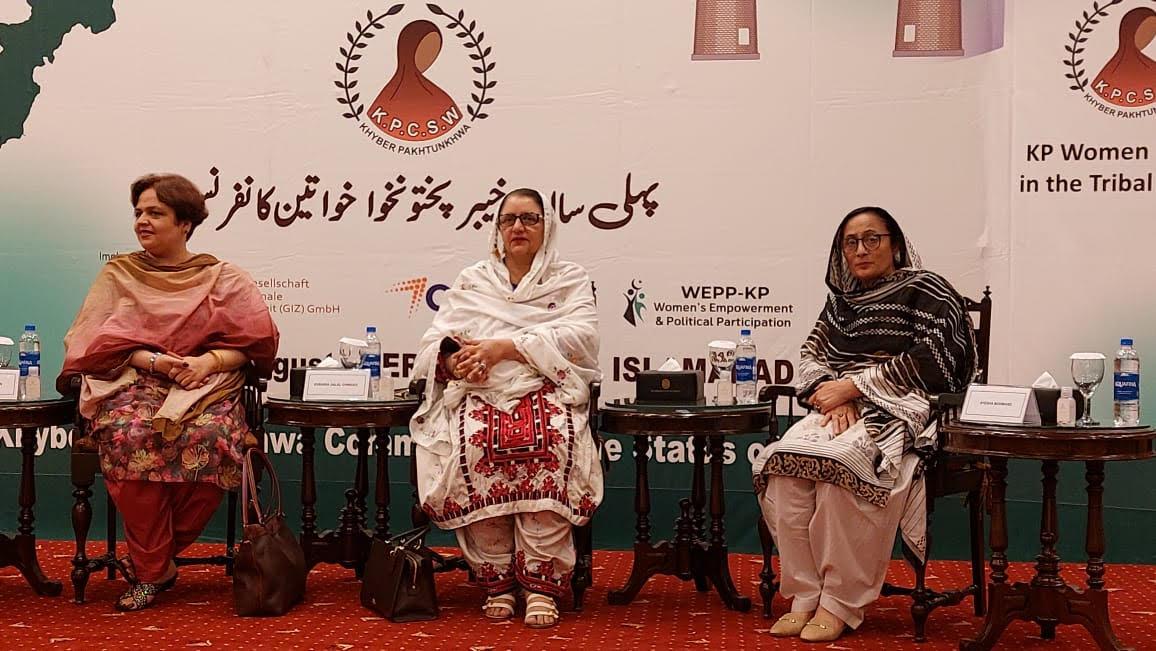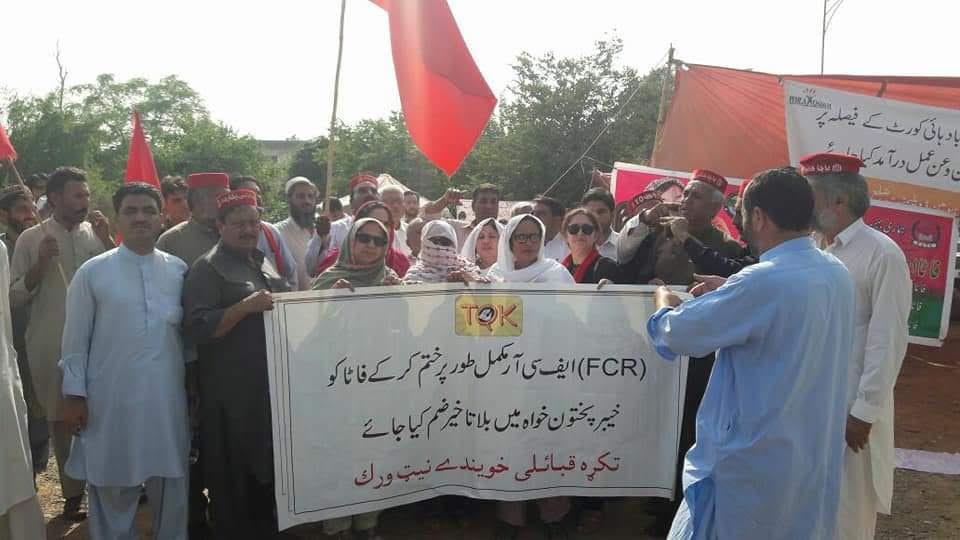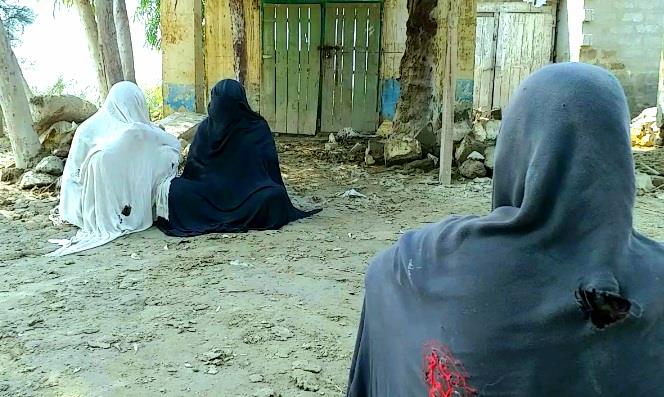
A War On Two Fronts: The Life Of Women In Pakistan's Former Federally Administered Tribal Areas
Life in Pakistan's former tribal areas is hard. Caught between both Afghan and homegrown Islamic fundamentalists and the suspicion of the Pakistan military, ordinary peaceful Pashtuns have been displaced in their millions since the early 2000s. Before this, the region bore the brunt of US and Pakistani militarization and radicalization in the Soviet-Afghan war of the 70s and 80s. Pakistani madrassas taught young Pashtuns to think in terms of war and violent Jihad, partly through learning materials designed in US universities. Today, Pakistan continues to view Islamic fundamentalism as a potential ally, both domestically and in Afghanistan – a policy that has repeatedly backfired, resulting in several military operations in the tribal areas that have caused immense collateral damage to the lives and property of peaceful tribal Pashtuns.
Life is even harder, however, for a woman living in the former tribal areas. They face a battle on two fronts. First, against the militancy and militarization of their homeland: military atrocities, the mobility limitations faced by women due to harassment at checkposts, and the delivery of public services to women in FATA. Second, against a domestic patriarchy of conservative Pashtun men. Both these 'fronts' reinforce each other. As one of my interviewees explained,“Every time soldiers harass a woman at a checkpost, men have another reason to not allow their daughters or sisters to travel: to school, to a job – anywhere!”
Also Read: Heritage Unveiled: KP's Hidden Wonders
None of this has stopped several brave tribal Pashtun women from active involvement in journalism, activism, and resistance politics. One such woman, and my interviews with her, serve as the inspiration for this essay. As our conversations show, there is tension between these women's efforts against domestic Pashtun patriarchy and those against the Pakistani state's repression. I, therefore, view the narration of her life story as a case study of how that internal tension is negotiated by FATA women.

Ayesha Mohmand receives questions from journalists on her campaign to integrate FATA with the rest of Pakistan. She argues that while FATA has since been regularized, the benefits of regularization (increased access to schooling, healthcare, and the Pakistani political process) have yet to arrive. Photograph captured on Mohmand's mobile phone by a colleague, undated.
Ayesha Hassan Mohmand , a senior political activist from Mohmand Agency in the former Federally Administered Tribal Areas (henceforth FATA), has advocated for the rights of both tribal Pashtun women and the wider tribal Pashtun community since 2002. Mohmand is, in many ways, representative of the average FATA woman. She is currently in Pakistan; she grew up in FATA; she has experienced many of the issues she discusses (for instance, she was denied an education by her family and also married off as an underage girl). She does not come from an economic elite, speaks very limited English, and is very much still involved in grassroots organizing in FATA, as a leader of the women-led civil society organization, Takrha Qabaeli Khwendey (brave tribal sisters).
The life story is a crucial part of the arsenal of Pashtun activists and political dissidents. It may be used to contest the wider societal acceptance of Pashtun suffering and death, through compelling and emotionally charged accounts of the ordinary details of the lives of those who have been killed or abducted by security forces. These accounts also actively contest the state's attempt to paint those killed as criminals. An example is the famous case of Naqeebullah Mehsud, murdered by Karachi police and falsely accused of being involved in terrorism. Activists and journalists, through telling his life story (including commentary on his social media presence), showed that Mehsud was an aspiring model and politically disinclined. Photos from modeling shoots, his struggles to escape a war-torn region, his relatable quest for financial stability to support his family: effective narrative strategies to undermine the state's criminalization and to challenge the stereotypes attached to (dead) tribal Pashtuns.
Ayesha, practiced in the art of the life story, uses polished, powerful language. She deploys 'quotable' statements such as“for every dead Pashtun man, there are four additional victims: his mother, his sister, his daughter, and his wife.” The first issue she introduced to me surrounds ID cards for FATA women.
Women in FATA find it very difficult to get ID cards made. It is a little bit better now, but 3-4 years ago it was almost impossible. Even now many women in FATA do not have their ID cards.”
What she emphasized most was why this was important:
“Without their ID cards, women are attached to the men in their families. Without their father, brother, or husband, they are nobody. They cannot even easily go to the police or courts or avail any of their rights since they have no identity papers. They cannot get a license or enroll in education, they cannot start a business or find a formal job. They cannot vote. Before, almost half the population of FATA could not exercise its right to vote, and so women's issues and concerns were not represented in politics. If we want better laws and policies for women in FATA, we need more women to be able to vote.”
She does not bother to explain why women deserve rights or representation to begin with because she assumes that I, as part of a liberal, metropolitan Pakistani audience, already agree with those principles. When she addresses the wider public, as in a 2015 seminar on women's rights, she can revert to arguments better suited for the mainstream conservative audience:
“When Islam gives rights and status to women then why they are kept deprived,” asked social activist Aisha from Mohmand Agency, saying that some traditions were still hurdles to women's development.
She also did not explain why tribal Pashtun women have difficulty accessing ID cards, until I prompted her explicitly. I believe she skipped the why of the matter because assumes my stereotypes about Pashtun patriarchy allow me to fill in the gaps. Ayesha does not feel the need to challenge these stereotypes initially, and instead uses them to her advantage and for expediency: Her listeners will (correctly, in this case) assume that FATA women cannot access ID cards due to socially conservative attitudes and restrictions imposed by the men in their families. This allows her to move into discussing impacts and possible solutions while avoiding the discomfort of explicitly taking a stance against male members of her community.

Ayesha Mohmand (appearing right) serves as a guest speaker for the Annual Khyber Pakhtunkhwa Women's Conference in Islamabad, hosted by the Women's Empowerment and Political Participation in KP project (WEPP-KP), GIZ, and the Khyber Pakhtunkhwa Commission on the Status of Women (KPCSW). Photograph captured on Mohmand's mobile phone by a colleague, undated.
Upon my probing, Ayesha confronted her discomfort with the 'speaking ill' of the men in her community with an interesting strategy. First, she explicitly took a stance against tribal Pashtun patriarchy:
“Things have been improving, but until a few years ago people in FATA thought that making an ID card for women was some sort of huge deal. Especially for young married girls or unmarried girls, ID cards were out of the question. The only reason it might be considered was so that they could travel for Hajj or Umrah [Islamic Pilgrimage, usually accessible only to relatively well-off families]. Getting ID cards made for a woman was considered shameful for her family, and so the men in the families did not allow the women to get their ID cards. Women cannot choose for themselves in anything; not even who they marry or when they marry. There is also a norm of child marriages in FATA, which I have worked on a lot. As you know, in FATA, a woman cannot even decide what color of clothing she wants to wear.”
Then, she hedged her argument with an explicit defense of tribal Pashtun men:
“But it is important for you to know that it is not only tribal Pashtuns which oppress women. Rape, kidnapping, and abduction are much less common in FATA because, aside from their old ways of thinking, people here respect women. I hope you don't mind me saying: there is much more rape and kidnapping of young girls by powerful landlords and politicians happening in Punjab. There is not a single case of rape in FATA. It is like with terrorism: they call us terrorists, but tribal Pashtuns are not terrorists. We have been turned into terrorists.”
Ayesha is aware of how tribal Pashtuns are stereotyped as backward, misogynistic people by the rest of Pakistan. She feels that, having taken a stance that risks confirming these stereotypes, she must offer a counterpoint. This counterpart is largely one of drawing cultural boundaries: Pashtun patriarchy is somehow less cruel and extreme than Punjabi patriarchy. She seems to argue that it is more based on an outdated conception of individual rights and liberties than an intention to exploit and harm women. The factuality of this is beyond the point (I highly doubt Ayesha's claim that there have been no rape cases in FATA). What is important is that, through the ways she tells her stories, she advocates for tribal Pashtun women's struggles against internal patriarchy while preserving opportunities for connection and conciliation with a wider, tribal Pashtun community in which men dominate. She makes clear that Punjab (and by extension, myself), where much of the country's military, business, and political elite come from, has no moral high ground to speak about Pashtun misogyny until it deals with its misogyny.
Aisha negotiates the conflict between the broader ungendered discourse and a gendered discourse of protest by saying:“Only we – insiders, the mothers, sisters, daughters, and wives of constantly dying Pashtun men – can criticize them. You can spectate our internal disagreements with Pashtun men but you cannot be a part of that discussion.” She seems on guard against giving her audience the notion that tribal Pashtun women need to be saved from tribal Pashtun men, and against confirming any existing stereotypes about the backwardness of Pashtun culture. Wars, including the 2001 invasion of Afghanistan, have been partly justified by a need to save helpless Pashtun women. Noble as that intention may be, war often disproportionately harms women.
Ayesha Mohmand seems to want us to be involved allies in Pashtun women's struggle against internal patriarchy, but no further. Perhaps this is a means of prioritizing between the two fronts: the external front, the discourse of critique against the state, takes priority over the internal discourse of critique directed at tribal Pashtun men – at least when speaking to the liberal, metropolitan audience of which I am a part.

Ayesha Mohmand, other members of her organization [Takra Qabailee Khwendi (Brave Tribal Sisters)], and civil society activists protest the Frontier Crimes Regulation in Islamabad. The FCR (abolished 2017) was a set of indirect rule laws which denied FATA residents many of the civil and legal rights of regular Pakistani citizens, allowed for collective punishments, and instituted a form of perpetual martial law. Photograph captured on Mohmand's mobile phone by a colleague, undated.Today, Ayesha continues to work for the empowerment of her tribal sisters. Having prefaced her statements with a defense of tribal Pashtun men, she seems more willing to speak openly about her ongoing work. She describes how she works to help women exercise their right to vote, a journey that began with her participation in local representative-body elections:
“In 2002, I contested and won our local elections. There were huge fights and struggles I had to overcome to do this, but after I won my relatives stopped visiting me and talking to me. People would talk about how I had done something dishonorable by contesting the election. At the same time, I faced problems in the representative bodies. They decided that the constituencies from which women had been elected would have their allocated funds assigned to a (male) Nazim [an agent or guardian of the local body]. However, the male representatives could control the funds for their constituencies. I fought hard against this, with journalists and NGOs, because I had won the elections fairly with votes just like the men.
As an elected woman, it was important for me that FATA women start voting. In 2002 women were not voting in FATA because the men in their families used to scare them by saying they would know who the women voted for. So women used to say there is no point in voting because we will just vote for someone we don't like.”
Aisha describes the awareness campaign conducted by herself and Takrha Qabaeli Khwendey to inform FATA women that their votes were confidential:
“In the end, many women voted just because we had corrected their false information. When they came out of the polling stations they smiled and told us they had voted. We did not ask them who they voted for. We asked them if they were happy and they said they were happy because they had been able to make their voices heard and they felt like their choices mattered.”
Ayesha is not arguing that voting led to an improvement in the material conditions of women. She is hopeful that the mere act of exercising the right to vote achieved something positive for FATA women, something that may one day lead to a tangible change in material circumstances. Ayesha tells me this is how you change society:
“These women know their rights now, they enjoyed voting. They will want to vote again, to learn about politics and issues that affect them. They can take part in the direction of society.”
Note: Tribal News Network (TNN) is presenting this series of interviews to offer a deeper understanding of the historical security, political, and social dynamics in erstwhile FATA. Originating in a journalism grant at Williams College, these conversations aim to shed light on the intricate experiences and perspectives that have shaped the region's trajectory. This project also represents the efforts of Pakistan's youth in learning about communities and topics that may lie outside their comfort zone. However, the views expressed in this series of interviews are those of the interviewers and interviewees, and may not necessarily reflect the views or stance of TNN regarding these issues.

Legal Disclaimer:
MENAFN provides the
information “as is” without warranty of any kind. We do not accept
any responsibility or liability for the accuracy, content, images,
videos, licenses, completeness, legality, or reliability of the information
contained in this article. If you have any complaints or copyright
issues related to this article, kindly contact the provider above.

















Comments
No comment